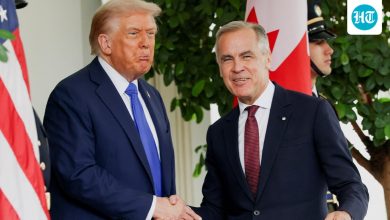On China, Republicans slam Biden administration for “appeasement”

Republican leaders in the United States (US) House of Representatives have slammed the Joe Biden administration for pursuing “fruitless engagement” with China; participating in talks with Beijing on terms, timelines and conditions set by China; displaying weakness and following a policy of “appeasement”; and delaying and slowing down on competitive actions that the US must pursue in its strategic competition with China.
US President Joe Biden, who just announced his re-election campaign for president, delivers remarks at North America’s Building Trades Unions Legislative Conference at the Washington Hilton, Washington D.C, U.S., April 25, 2023. (REUTERS)
The administration has rejected the charge and claimed that it has taken “unprecedented” steps to compete with China. It has also claimed that the engagement with Beijing has happened from a position of strength rather than weakness and on terms set by the US, and Washington DC is not “pulling any punches” in the strategic competition with China.
In a hearing on Capitol Hill on Tuesday, during a meeting convened by subcommittee on Indo-Pacific affairs of the House Foreign Affairs Committee (HFAC) to discuss the administration’s budgetary request for the region for this year, HFAC chair Michael McCaul and subcommittee chair Kim Young — both Republicans — grilled US assistant Secretary of State for East Asian affairs Daniel Kritenbrink on the administration’s China policy.
In recent months, the US, in pursuit of its policy of maintaining open channels of communication, has sought to deepen dialogue with China. Secretary of State Antony Blinken, treasury secretary Janet Yellen, and climate envoy John Kerry have travelled to Beijing while national security advisor Jake Sullivan met senior Chinese Communist Party foreign policy figure Wang Yi in Vienna. Biden is expected to speak to China’s president Xi Jinping in the coming the months.
McCaul, the senior most Republican foreign policy figure in the House, said that he was not against diplomacy but effective diplomacy should “shape the adversary, not the other way round”. “Recent diplomacy has demonstrated weakness. Weakness invites aggression and emboldens dictators such as Xi.”
Providing a timeline of events to substantiate his argument, McCaul said that the US discovered a Chinese spy balloon traversing its continental territory on January 28; it was only after Congressional pressure that Blinken, “after seven days”, cancelled his scheduled trip to China in early February. In the spring, China raided American businesses, yet Sullivan met Wang soon after.
On May 15, China, McCaul said, had hacked the emails of senior officials of state and commerce departments, including that of commerce secretary Gina Raimondo and of Kritenbrink himself. On May 22, it banned Micron from selling chips in China. “Yet, on June 2, Secretary of Defense Lloyd Austin requested a meeting with his Chinese counterpart at Shangrila dialogue. The meeting was rejected and he settled for a handshake.”
On June 3, on the anniversary of the Tiananmen Square massacre, McCaul reminded Kritenbrink that the latter had travelled to Beijing in an “astonishing display of appeasement” by this administration.
McCaul then pointed out that on June 8, reports said that China had set up a spy base in Cuba, and the following week, Beijing stole “tens of thousands” of emails, including of nine officials of the East Asia Bureau in State Department. “On June 18, Blinken still travelled to China.” In early July, the administration, McCaul said, had pulled down a notification to the Congress on support to Taiwan. “The price we paid to secure Yellen’s visit, merely to get a meeting, may have been too much.” The HFAC chair added that the Congress had given the President the drawdown authority to provide weapons to Taiwan which the administration hasn’t used and weapon sales haven’t been processed. “When I went to Taiwan, the first question President Tsai (Ing-wen) asked where are my weapons I paid for?”
McCaul also said that the State Department had delayed controls on Huawei; it had stonewalled enforcing sanctions as a part of the Uighur Forced Labor Prevention Act; and it had constantly stonewalled requests from the House to submit a “competitive actions” calendar and related documents vis a vis China, including not responding to a subpoena. “The administration is indifferent to CCP hostility. I agree that you need to talk and diplomacy is important. But we are trapped in a cycle where CCP dictates terms, timing and conditions of meetings rather than the other way around. Be at the table through strength and leverage rather than weakness and appeasement. Acknowledge China for what it is,” McCaul said.
The subcommittee chair, Young, said that the administration had been “chasing fruitless engagements” with China even as $19 billion of weapon sales to Taiwan remained pending. She said that as a part of a Congressional delegation to northeast Asia, she had repeatedly heard allies voice concern about how Ukraine today could be Taiwan tomorrow. “Allies and partners are also worried about growing economic coercion. The Indo-Pacific Economic Framework is not enough. We were also disappointed to hear that the Biden administration is not interested in pursuing free trade agreements,” Young said, emphasising the importance of “concrete economic arrangements”.
She also said that the US would not be able to adopt a “whole of government” approach on China if the State Department did not engage with the Congress and instead chased these “fruitless engagements”. Young also raised the spy balloon issue and questioned Biden’s characterisation of the issue as “silly” and Blinken terming it as a “closed chapter”.
In his opening statement, as well as questions from the members, Kritenbrink said that the US was committed to the Indo-Pacific and committed to building the capabilities of allies and partners. While saying that China was a part of the American Indo-Pacific strategy, but did not define it, the assistant secretary said that the strategic competition with China was most pronounced in Indo-Pacific. The US, he said, was engaging with China from a “position of confidence”, based on American diplomacy with allies and partners in the region and investment in strengths at home.
On the specific concerns raised by the Republican leaders, at different points during the hearing, Kritenbrink said, “It is not true that we are pulling our punches in any way. We have taken unprecedented steps in a broad range of areas…We are committed to holding China to account for its ongoing egregious abuses (in Xinjiang) and are absolutely enforcing sanctions..We have taken steps against Huawei…We took the spy balloon incident very very seriously and raised it with China.”
Kritenbrink also claimed that the meetings with China happened on US timeline and conditions, Washington had raised actions taken against American companies with China, and reminded the House of the October 7, 2022 order that imposed severe restrictions on semiconductor-related exports to China.
ABOUT THE AUTHOR 




